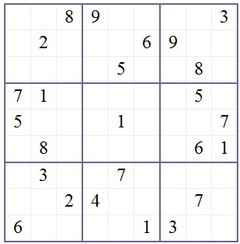All the world abuzz about Sudoku
 At a conference recently, I asked a delegate from Japan about Sudoku (??, sudoku) presuming that he, being from the originating country, would have some insights I didn't. Oddly enough he hadn't heard of it. Is this Japanese game sweeping the world, save Japan?
At a conference recently, I asked a delegate from Japan about Sudoku (??, sudoku) presuming that he, being from the originating country, would have some insights I didn't. Oddly enough he hadn't heard of it. Is this Japanese game sweeping the world, save Japan?
From WebSudoku.com: The rules of Sudoku are simple. Enter digits from 1 to 9 into the blank spaces. Every row must contain one of each digit. So must every column, as must every 3x3 square.
Folks seem obsessed with it. When I came upon the puzzle I figured it was a fluke, a curiosity, but then I noticed that American Airlines had Sudoku proudly displayed next to their Crossword Puzzles in the in-flight magazine. It's big in the UK. Some are 'unsolvable' (really hard, no logic applies). PocketMod includes pages with generated Sudoku puzzles.
Personally, I did a few, found it hard, found it interesting, but not that engaging. I mean, it doesn't tickle the nice parts of my brain like Crosswords. I feel that Crosswords require thinking, while Sudoku requires processing. Maybe that's not phrased well, but I think that since most programmers first instinct is to write a solver, and some write the solver faster than they can solve the puzzle just proves my point. Computers are a tool, my brain is not a computer. But, my brain can use a computer to solve a Soduku better than by itself. Trying to make my brain work like a computer just makes it ache.
BTW, don't mis-spell it, because Soduku is rat-bite fever!
About Scott
Scott Hanselman is a former professor, former Chief Architect in finance, now speaker, consultant, father, diabetic, and Microsoft employee. He is a failed stand-up comic, a cornrower, and a book author.
About Newsletter
I have a friend who has what I call Compulsive Gadget Syndrome. He is unable to ignore hand held puzzles or chotchkeys.
Those things have a mysterious alien like power over him. It's kinda like the lock-in look that a dog gets when it sees a cat. He's got to pick them up and can't stop figgeting with them no matter what.
I'm going to pass this on to my friend and see if the addication extends to digital puzzles.
As a matter of fact, that's exactly what I did. Didn't even get past my first puzzle ;) http://www.emperorxlii.com/sudoku/
I don't find the Sudoku puzzles all that interesting myself, but here's something I heard: something like 80% of the people that enjoy Sudoku are women - and that seems to be backed up by my own observation that all the people I know of who like it are women - none of the men I know seem to be interested in it.
Wonder if this will be the same in the States...
What does Su Doku actually mean? None of my Japanese colleagues seem to know the original Japanese name. Ryoko Attwell, Buckinghamshire
You won’t find Su Doku in a Japanese dictionary. It’s a coined word, made up by a Japanese publisher – just like advertising men here make up words like KwikRite and StopzIt. I don’t speak Japanese, but as I understand it Su stands for number, and Doku has some notion of singularity or bachelorhood about it, emphasizing perhaps that there is only one of each number in each unit (row/column/box).
The problem is finding puzzles that are sufficiently difficult that backtracking is actually required (which is visually more interesting). Most of the published puzzles in newspapers and books – although challenging to the human – don’t require the program to backtrack even once.
I did find a few examples that cause the program to backtrack (the best I found were at http://www.conceptispuzzles.com/products/sudoku/puzzle_samples.htm). If anyone would like the code, let me know.
In others words : How to programming Sudoku in OPL langage
Thank you very much
Comments are closed.

I am a two to three puzzles a day type of guy
- one on the train to work
- one on the way home
- perhaps one in the evening if the cravings arise